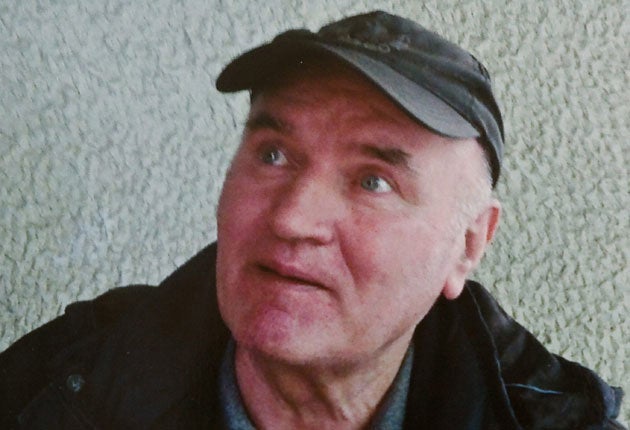Serbia 'certain' to reject plea for Mladic trial to be halted
Defence stalls as nationalists take to streets over general's extradition

Your support helps us to tell the story
From reproductive rights to climate change to Big Tech, The Independent is on the ground when the story is developing. Whether it's investigating the financials of Elon Musk's pro-Trump PAC or producing our latest documentary, 'The A Word', which shines a light on the American women fighting for reproductive rights, we know how important it is to parse out the facts from the messaging.
At such a critical moment in US history, we need reporters on the ground. Your donation allows us to keep sending journalists to speak to both sides of the story.
The Independent is trusted by Americans across the entire political spectrum. And unlike many other quality news outlets, we choose not to lock Americans out of our reporting and analysis with paywalls. We believe quality journalism should be available to everyone, paid for by those who can afford it.
Your support makes all the difference.Ratko Mladic looks certain to be extradited to The Hague within days to face trial for war crimes, despite a last-minute appeal and protests by Serbian nationalists.
Mladic will be transferred to the International Criminal Tribunal for the former Yugoslavia (ICTY) from his Serbian prison cell if the appeal, lodged on grounds of ill health, fails as expected.
Mladic faces 15 indictments related to the killing of around 7,500 Bosnian Muslim men and boys at Srebrenica in 1995 and the 1,400-day siege of Sarajevo, during which 10,000 civilians died. From 1992 to 1996, Mladic was commander of the main staff of the Bosnian Serb forces held responsible for a number of war crimes.
Mladic's lawyer, Milos Saljic, filed a formal letter to the Belgrade High Court yesterday morning, requesting that his client see a range of medical specialists who could confirm that the general is unfit to face trial in the Netherlands.
Mr Saljic claims that Mladic, who is understood to have suffered at least two strokes in recent years, needs to see specialists including a cardiologist and psychiatrist, and that he is so ill that he will die before any trial begins. The attorney has said that Mladic is partly paralysed and incapable of coherent conversation.
However, the appeal is almost certain to be rejected. The court has already ruled that Mladic is fit for extradition, and the authorities have rubbished Mr Saljic's decision to mail the appeal as a delaying tactic. Chief war crimes prosecutor Vladimir Vukcevic has reported that Mladic is in high spirits, and yesterday justice ministry state secretary, Slobodan Homen, told Serbian broadcaster B92 that Mladic is "absolutely certain" to be transferred to The Hague.
"Obviously Mladic's lawyer and family are trying to prolong the process in the hope something will happen with his health, but it's impossible," Bratislav Grubacic, a Belgrade-based analyst and journalist, told The Independent. "They want to buy some time to keep him in Belgrade as long as possible. But it's impossible unless there's a spectacular reverse, so we're just talking three or four days instead of one."
Mr Saljic expects a response today, after which the process of extradition is likely to move swiftly. Once the appeal has been rejected, the justice ministry must give final approval for Mladic's move, which is likely to be a formality. Mr Homen has said that Mladic will leave Belgrade in two to four days. While the court is allowed three days to discuss the appeal, it is also permitted to pass a decision immediately.
B92 has reported that the exact date will be kept secret due to security concerns, as it is strongly opposed by Serbia's ultra-nationalists.
A rally in support of Mladic in Belgrade on Sunday night turned violent, leading to 111 arrests and leaving 32 police and 11 protesters with minor injuries, according to the interior ministry. Hooded youths smashed paving and hurled rocks and bottles at riot police after the demonstration outside parliament, which was called by the far-right Serbian Radical Party (SRS), the largest opposition party.
Until the end, the demonstration, attended by several thousand, was largely peaceful. Protesters waved flags with pictures of Mladic and hardline SRS leader Vojislav Seselj, who is on trial for war crimes at The Hague. Many were wearing clothes with Serbian nationalist emblems and slogans, including one man in a T-shirt bearing the words "Srebrenica – Republika Srpska", a reference to the city made notorious by the massacre, which is now part of the Bosnian Serb autonomous entity.
Some chanted "Save Serbia, kill yourself Boris", referring to President Boris Tadic, who has basked in international approval since Mladic's arrest. It is the same chant once directed at dictator Slobodan Milosevic during protests in 2000 that led to the storming of parliament and Milosevic's fall from power.
The speakers addressing the crowd included Mladic's son, Darko, who stated that "Ratko Mladic is not a criminal, he did not order the killings. He defended his people in an honourable, fair and professional manner."
SRS speakers called for a "Greater Serbia", including Kosovo, parts of Bosnia and the Krajina region in Croatia in which Mladic cut his fighting teeth in the early days of the Yugoslav wars. The party vice-president asserted that "80 per cent of Serbs don't want to hear about the EU". Darko Mladic attacked the West, saying that "we will never accept those who bombed us to write our history".
Subscribe to Independent Premium to bookmark this article
Want to bookmark your favourite articles and stories to read or reference later? Start your Independent Premium subscription today.
Join our commenting forum
Join thought-provoking conversations, follow other Independent readers and see their replies
Comments